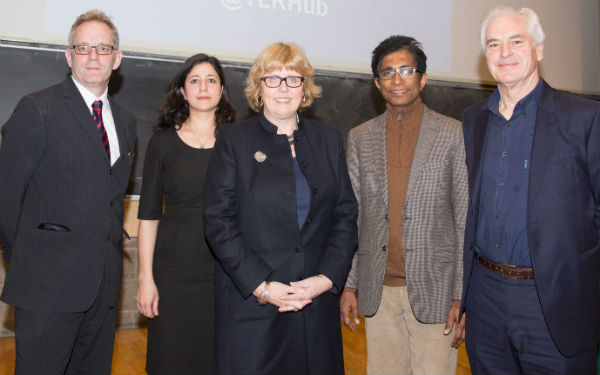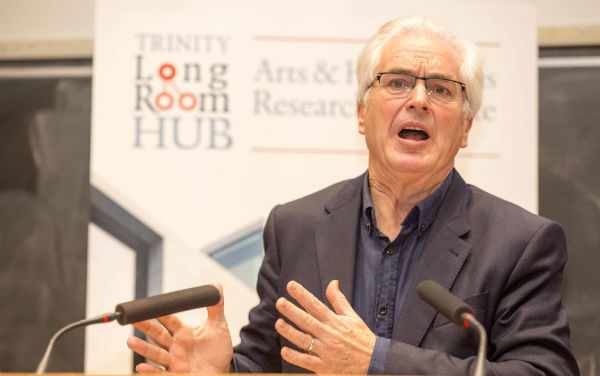Inside the Mind of the Terrorist and the Terrorised
Posted on: 18 February 2016
Fear and dehumanisation are the key drivers of terrorism and usually lead to policies which accelerate the engines of terrorism, according to Professor Ian Robertson who spoke at a public event focusing on the complex causes and effects of terrorism in Trinity College Dublin on Thursday, February 18, 2016.
At the public event, which forms part of Trinity Long Room Hub’s Behind the Headline’s discussion series, experts from the fields of psychology, law, ecumenics and Middle Eastern studies focused on the experience of terrorism in the 21st century and explored how we can learn to live with the threat of terrorism today.
At the event, Ian Robertson, Professor of Psychology, explored the individual and group psychology of terrorism and how the terror it evokes plays out in the mind of the terrorised. He also outlined new research in the aftermath of the 2005 London bombings which showed a significant shift in people’s attitudes towards immigrants and Muslims.
Professor Robertson commented: “Terrorism is a form of attempted mind control which aims to induce large populations of people to change their behaviour, attitudes and emotional responses in a direction desired by the terrorist. Research in the wake of the 2005 London bombings showed that members of the public not directly involved in the bombings experienced significant attitudinal changes including, lowered concerns with fairness in society and a greater prejudice towards immigrants and Muslims. This attitude change was most marked among people with a liberal orientation.”
“This is exactly the sort of reaction that the jihadis who planned the attacks wanted because their aim was to push public attitudes in a direction that would justify their claim of a ‘crusader’ persecution of Muslims worldwide and help them attract more disaffected recruits from the fringes of mainstream Muslim society.”

“One key engine of terrorism is the dehumanisation of the enemy and the simultaneous binding together of the terrorists in a camaraderie that fills the internal void that many alienated potential terrorists feel in modern Western society. But this dehumanisation goes both ways, as we see from the London study, and must be resisted. People can bomb ‘things’ but find it harder to bomb real people like themselves. A second key engine of terrorism is fear which fuels emotion-driven thinking and usually leads to policies which accelerate the engines of terrorism.”
The rise in the number of women suicide bombers in the last decade has challenged the status quo of women across the Middle East, according to Roja Fazaeli, Assistant Professor of Islamic Civilisations, who also spoke at the event.
“There has been a significant rise in the number of female suicide bombers in the Middle East since 2002. Female suicide bombers complicate the hyper-masculine image of Islamic extremism that is sometimes seen as part and parcel of the idea of women’s oppression across the Middle East.”
“A number of factors may account for this rise. Terrorist recruiters may feel that female suicide bombers can achieve better tactical surprise. Another theory is that the high casualties being experienced by insurgent groups have left a void that is being filled by female recruits. Others argue that the use of women in suicide missions is a radicalising and shaming tool used by terrorist groups to motive men to join the movement.”

Also at the event, Neville Cox, Associate Professor in Law, focused on the increasingly endemic view that there is an inherent link between the teachings of Islam and terrorism. He argued that a thorough analysis of what Shari’a law says about the use of force does not support this idea.
Professor Cox explained: “In the 21st century the message that there is some kind of inherent link between the teachings of Islam and terrorism is endemic. It is very difficult to support this idea unless one interprets the law out of context. It is true that the Qur’an does envisage the use of force as an element of the broader concept of jihad (struggle) in the name of Islam. But, like equivalent references in the Jewish scriptures, mentions of the use of force in the Qur’an may relate to specific factual events and should arguably be interpreted accordingly. In addition, the Qur’an sets out a number of procedural and ethical constraints on the use of force of which are, potentially, violated where terrorism is concerned.”
“There is no doubt that individual Muslims who are minded to engage in acts of violence may be able to find support for what they do within individual verses of the Qur’an. However, such an interpretation is highly controversial and suspect and should not be used as a basis for western media to assume that there genuinely is a link between Islam the religion and terrorism.”
Jude Lal Fernando, Assistant Professor in Intercultural Theology, focused on the terms ‘war on terror’ and ‘terrorism’ and examined the ways in which political polarisation can be overcome.
Dr Fernando commented: “Language is not only a tool of communication. It also constructs reality in a particular way. The terms ‘war on terror’ and ‘terrorism’ refer to political violence of different types while constructing a reality of two polarised positions in the public domain. In my presentation, it will be shown how both constructed positions mutually reinforce the other. My main focus will be on the binary of ‘war on terror’ and the rise of militant variant of political Islam which seems to portray a conflict between ‘liberal and secular’ West and ‘illiberal’ and ‘religious’ Middle East.”
“There are three main contemporary political processes (Afghan war, Invasion of Iraq and Syrian conflict) within which the militant variant of political Islam has been formed. A close look at the political dynamics of these three phases can compound the rigid binary of ‘war on terror’ and ‘terrorism’. Old enemies have become new friends and old friends have become new enemies. ‘Secularists’ have joined hands with ‘religionists’, ‘liberal states’ have allied with ‘conservative religious states’, etc. It is necessary to have a grasp of these political alliances in responding to the atrocities committed by ‘war on terror’ and ‘terrorism’.”
